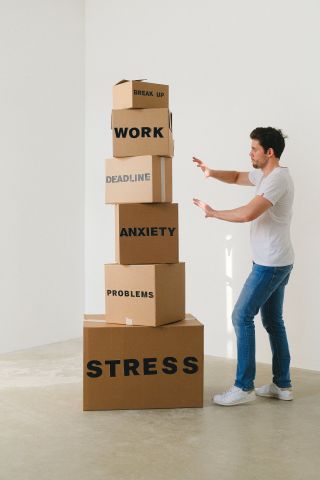Resilience
How Do You Prevent Maladaptive Resilience?
Maladaptive resilience may be a better term than toxic resilience.
Posted January 19, 2024 Reviewed by Lybi Ma
Key points
- The term toxic resilience describes tolerating situations that shouldn't be endured.
- Maladaptive resilience can have ripple effects, affecting you and those around you negatively.
- Take steps to recognize and halt maladaptive behavior as soon as it emerges.

You may have seen the term toxic resilience being used by life coaches, human resource professionals, and on social media. Such a term may be an oxymoron, sort of like saying "disgusting beauty" or "really bad goodness." After all, isn't having resilience in general a good thing since it is the ability to readily deal with, adjust to, and recover from adversity? And as the Britney Spears song made clear, things labeled as toxic don't tend to be good things. The dictionary definition for toxic is "acting as or having the effect of a poison."
How can something that's typically positive get to the point where it's poisonous?
Well, those who have been plastering toxic resilience in their articles and posts have been using the term to describe situations where you continuously cope with and adapt to very tough situations without making enough effort to change the situations and take care of yourself. It's not the resilience that is toxic. People don't often say, "I'd like Jenny if only she weren't so resilient." What ultimately can be toxic, though, is the very tough situation, whether it's an abusive boss, pervasive discrimination, unreasonable workloads, or other continuing problems, that go unaddressed. When people put up with this toxicity, such tough situations may simply continue or even grow. Maybe a better term would be maladaptive resilience.
Maladaptive resilience is a common term in the medical profession. Medical training can be filled with unreasonable expectations such as coping with poor sleep, skipping meals, and forgoing bathroom breaks as well as racism, misogyny, harassment, and all sorts of discrimination. If I had a nickel for every time someone said, "That's just the way things are," I'd have a lot of nickels. The expectation to put up with such circumstances doesn't necessarily stop once you've completed your medical training. I've seen physicians silently suffer through bad working conditions, abusive higher-ups, and immense stress while barely complaining or pushing for change. Ignoring such bad situations takes its toll over time. Therefore, it's not surprising that unhappiness, dissatisfaction, and burnout have been growing problems among physicians.
Medical professionals have by no means cornered the market on maladaptive resilience. It can manifest in nearly any profession. It can be more common among those demographics who have not traditionally held power in a profession or organization such as people of color, women, and other minorities. People who have traditionally been left without real decision-making power may feel that keeping a stiff upper lip is the only way of maintaining a seat at the table. Or at least a seat somewhere near the table or perhaps even a seat that serves the table.

But humans aren't like a pair of Spanx. They can't keep stretching and stretching and then be expected to always snap back into a form-fitting shape again. Putting up with bad treatment and circumstances can be like squeezing a balloon animal. That pent-up stress has to go somewhere and can pop up in distant and unexpected places. This can manifest as bad behaviors towards the innocent such as significant others, friends, family members, co-workers, or anyone else whom you don't consider your "superior." Pent-up stress can also be like a Pac-Man inside your body, eating up your insides and potentially causing a variety of stress-related physical ailments.
Moreover, when you suffer from maladaptive resilience, you may expect the same from those around you: the classic situation: "I put up with it, so you should too." This is when you can become toxic to others.
It's important to recognize and halt maladaptive resilience as soon as it emerges.
- Remember the airplane oxygen mask advice: At the beginning of flights, the attendants will typically tell you, "If the cabin loses pressure and the oxygen masks drop, put the mask on your face first before assisting others." You can't take care of others without first taking care of yourself.
- Take adequate breaks for self-care and reflection: When you are smack in the middle of a situation or being smacked by the situation, you may not fully realize how bad things are, especially if you are in survival mode.
- Trust your gut: If the situation doesn't feel right, chances are it isn't right. If you find yourself asking, "Why am I putting up with this," the answer often is, "No good reason."
- Be real and honest with yourself and others when you feel frustrated or overwhelmed: Being real is important.
- Find appropriate benchmarks: Are you being treated worse than others? Are you being forced to deal with more than others have to endure? If so, something has to change.
- Put your ego and fears into your fanny pack: Don't worry about how you might be viewed if you raise concerns about and try to change a bad situation. If you are worried about losing your position or your job, put things in perspective. Do you truly want to be in a position that keeps you in a bad situation?
- Take action to correct the bad situation: This may mean talking to those in charge. Be frank. Without knowing how you truly feel, those in charge may not be able to take the right action.
- Set a time limit for the situation to change before escalating: Escalating can mean seeking help elsewhere or leaving the bad situation.
- Don't be afraid to leave a bad situation: I know people who have complained about their jobs for, oh, like a decade or more. Yet, with every passing year, there they still are. As President George W. Bush once said, "Fool me once, shame on... shame on you. Fool me—you can't get fooled again." Once you realize that a bad situation won't change, make like a tree and get out of there.
Again, in general, it's good to be adaptable. It's good to be strong. But enduring something when you shouldn't do so can in the end be quite wrong.
References
The Dark Side of Resilience. Adversity and Resilience Science, Journal of Research and Practice. H. Mahdiani, M. Ungar, 2021.
Also, see Forbes.


